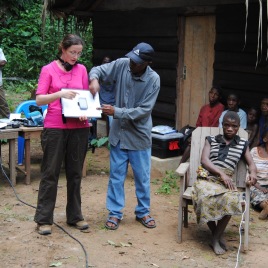Changes to the wind pattern due to climate change could cost an extra $47 billion USD in fuel, and an additional 4.6 million kg of CO2 emissions per year, for three flight paths between Hawaii and the western U.S.A. These changes could create a feedback loop as carbon emissions are expected to increase, causing further […]
Tag: human behaviour
Living near trees leaves people feeling healthier
A new study of 13,000 residents of Toronto, suggests that living in a neighbourhood with more (and or larger) trees leads people to report feeling healthier. The research team used Toronto tree density data and combined this information with a self-reporting questionnaire of general health perception and certain medical conditions including heart disease, stroke and […]

Oldest-known stone tools pre-date Homo habilis
Stone tools dated to 3.3 million years ago, discovered in Kenya, indicate that early humans were making tools much earlier than previously thought. The stone-tool culture associated with the genus Homo has commonly been dated back to around 2.6 million years ago, 700,000 years after this recent discovery. Researchers found markings on stone-made anvils, hammers […]
Walking or biking to work may help with weight loss
Switching from driving to work to walking, cycling, or taking public transit may help commuters lose weight according to an observational study. By analyzing responses to the British Household Panel Survey from 2004-2007, researchers have found making the switch results in an average weight loss of one kg. The longer the commute the stronger the associated […]
Physicians and veterinarians should collaborate to make pet owners healthier
A group of physicians is recommending certain precautions and greater collaboration between veterinarians and physicians to reduce the risk of diseases associated with owning a pet. Pets are a potential source for more than 70 human diseases yet the researchers who reviewed existing studies found that physicians generally fail to regularly discuss the […]
Women in science: strength lies in numbers
How do you encourage women to remain active in science, technology, engineering and mathematics? One route seems to be in creating environments in which female students participate in small groups with high proportions of women, says a new study. In a U.S. study, 120 female undergraduate engineering students were assigned into four-person groups that varied […]
Do you have eco-friendly friends?
Canadians with personal ties to members of environmental organizations are more likely to engage in eco-friendly behaviours such as recycling and buying a more fuel-efficient car than those with no such ties, according to a new study. Using data from two surveys carried out in Canada in 2007, researchers conclude that individual-level social connections to […]
The origins of narcissism in children
A new study has shed light on the origins of narcissism in children and the role parents play in its development. A Dutch study of 565 children and their parents over two years found that children whose parents over-value them are more likely to suffer from narcissism. Until now the origins of narcissism were thought […]
Suicide and looking for a job
While it has been known that there is a link between unemployment and suicide, a new study quantify this link with unemployment in regard of the recent economic crisis. A study looking at 63 countries over 11 years — including Canada — has found that unemployment might account for nine times as many suicidal deaths […]

Facebook could know you better than your spouse
If you have 100 or more Likes on Facebook then your computer believes it knows you better than the average person, and if you have 300 or more, then it believes it could know you better than even your spouse. Researchers analysed both individuals’ responses to a personality questionnaire and obtained information on Facebook […]

Music can transcend culture
Montreal hipsters’ and Congolese pygmy tribe members react to some elements of music in the same way, according to a new study. Forty Pygmies and 40 Canadians listened in pairs to 19 music excerpts (eight Pygmy and 11 Western instrumental excerpts) and were asked to rate the songs (arousing or calming, positive or negative.) Researchers found […]

Battle of the brains: Men v. Women
A group of scientists have reviewed the data and the answer is in, men are more likely to be more idiotic than women. The authors reviewed 20 years of the Darwin Awards – which tell the ridiculous stories of how people accidentally kill themselves – and found that men made up 88.7 per cent of […]
The mystery of the old magazines in the waiting room
Physicians waiting rooms contain mainly old magazines and researchers have found that it was because current magazines have a greater risk of being stolen than older ones, a new study reports. Also, they observed that gossip magazines (with celebrity photographs on the cover) were more likely to disappear than other types (Time magazine and The […]
No apparent correlation between HPV vaccine and risky sexual behaviour
Vaccinating teenage girls against the human papilloma virus (HPV) does not appear to increase risky sexual behaviour. There was concern that receiving the vaccination would cause an increase in such behaviour, however this study shows the concern is unfounded and should not prevent vaccinating girls at a young age. The study followed over 260,000 girls […]
Behaviour: Does banking culture increase dishonesty?
The business culture in the banking industry may favour dishonest behaviour, a new study suggests. The authors asked 128 employees from a large international bank to play a game where they could keep the money they earned in a coin tossing game. The employees that were asked job-related questions before the experiment started cheated and […]
Do STIs influence the evolution of monogamy?
One might think that the rate of sexually transmitted infections (STIs) could have an impact on whether an organism evolves monogamous behaviour, but a new study shows that it’s likely not as important as other factors. Researchers built a mathematical model to assess whether the benefit of reducing infection risk via monogamous behaviour outweighs the […]